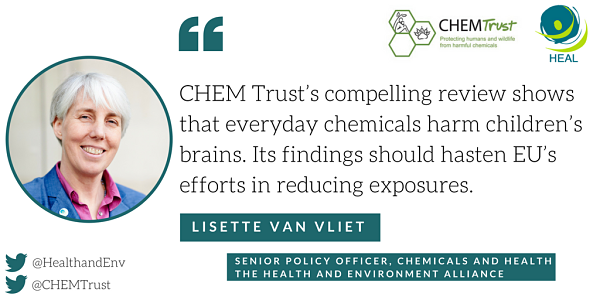The EU’s proposed 2040 climate target to reduce domestic emissions by 90% - while allowing up to 3% to be met through international carbon credits – risks undermining health protections. The Health and Environment Alliance calls on member states to strengthen their climate commitments in order to protect health, rather than delay and weaken overdue action.

Review builds compelling evidence that chemical exposure harms children’s brains Brussels, 7 March 2017 – The Health and Environment Alliance (HEAL) has welcomed today’s publication of a review by CHEM Trust on chemicals that harm the brain development of children. CHEM Trust’s review, “No Brainer – The impact of chemicals on children’s brain development: a cause for concern and a need for action” – calls for immediate action by the EU. Lisette van Vliet, Senior Policy Adviser, Health and Environment Alliance (HEAL), says: “The evidence is mounting. This valuable review of the literature shows that the normal development of children’s brains is under threat from toxic chemicals. Do we really want to wait until the evidence is incontrovertible but the damage has already become widespread? The European Commission should use these recommendations to speed up measures reducing everyday exposures to neurotoxic chemicals and thereby help every child meet his or her full potential.” A copy of CHEM Trust’s press release is available below. The Health and Environment Alliance (HEAL) is a leading European not-for-profit organisation addressing how the environment affects health in the European Union (EU). With the support of more than 70 member organisations, HEAL brings independent expertise and evidence from the health community to different decision-making processes. Our broad alliance represents health professionals, not-for-profit health insurers, doctors, nurses, cancer and asthma groups, citizens, women’s groups, youth groups, environmental NGOs, scientists and public health research institutes. Members include international and Europe-wide organisations as well as national and local groups. Website: www.env-health.org. Follow HEAL on Facebook and Twitter @HealthandEnv @EDCFree and @CHM_HEAL >>>>>>>>>>>>>>>>>>>>>>>>>>>>>>>>>>>>>>>>>>>>>>> CHEM Trust Press release IT’S A NO BRAINER! Action needed to stop children being exposed to chemicals that harm their brain development! Tuesday 7th March 2017 – A report published today by CHEM Trust [1] highlights how chemicals in food and consumer products used in homes, schools and offices could harm brain development in children. The impacts – which may include ADHD and lower IQ – are avoidable and can prevent children reaching their full potential says CHEM Trust, in No Brainer – The impact of chemicals on children’s brain development: a cause for concern and a need for action. Researchers have shown that many thousands of people have been exposed to now largely-banned chemicals such as lead and PCBs at high enough levels to have harmed their brain function. Now there is growing concern about the impacts of exposures to many of the ‘new’ chemicals in our 21st century lifestyles. Chemicals of concern include brominated flame retardants (BFRs), a group of chemicals added to furniture, electronics and building materials, per- and poly- fluorocarbons (PFCs), used for non-stick coatings or breathable coatings in everyday products including packaging and clothes. Some chemicals in these groups are being phased out, but similar chemicals remain in everyday use. The study also points out the unpleasant reality that children are constantly exposed to a cocktail of chemicals, which can act together, something which is still largely ignored by chemical safety laws. CHEM Trust propose a range of policies that could help address this challenge, for example faster regulatory action on groups of similar chemicals, and development of new methods for identifying chemicals of concern. They also include advice for consumers on how to reduce their exposure [2]. Dr Michael Warhurst, Executive Director of CHEM Trust, said: “The brain development of future generations is at stake. We need EU regulators to phase out groups of chemicals of concern, rather than slowly restricting one chemical at a time. We cannot continue to gamble with our children’s health.” The report has been peer reviewed by two eminent scientists in the field, Professor Philippe Grandjean and Professor Barbara Demeneix. Prof Barbara Demeneix (Laboratory of Evolution of Endocrine Regulations, CNRS, Paris) said: “Chemical exposure is now at unprecedented levels, is multiple, ubiquitous, and present from conception onwards” Prof. Philippe Grandjean (Department of Environmental Medicine, University of Southern Denmark, Denmark & Department of Environmental Health, Harvard T.H. Chan School of Public Health, Boston, USA), added: “The chemical brain drain that we are now witnessing is a serious public health concern and a threat to human intelligence”



